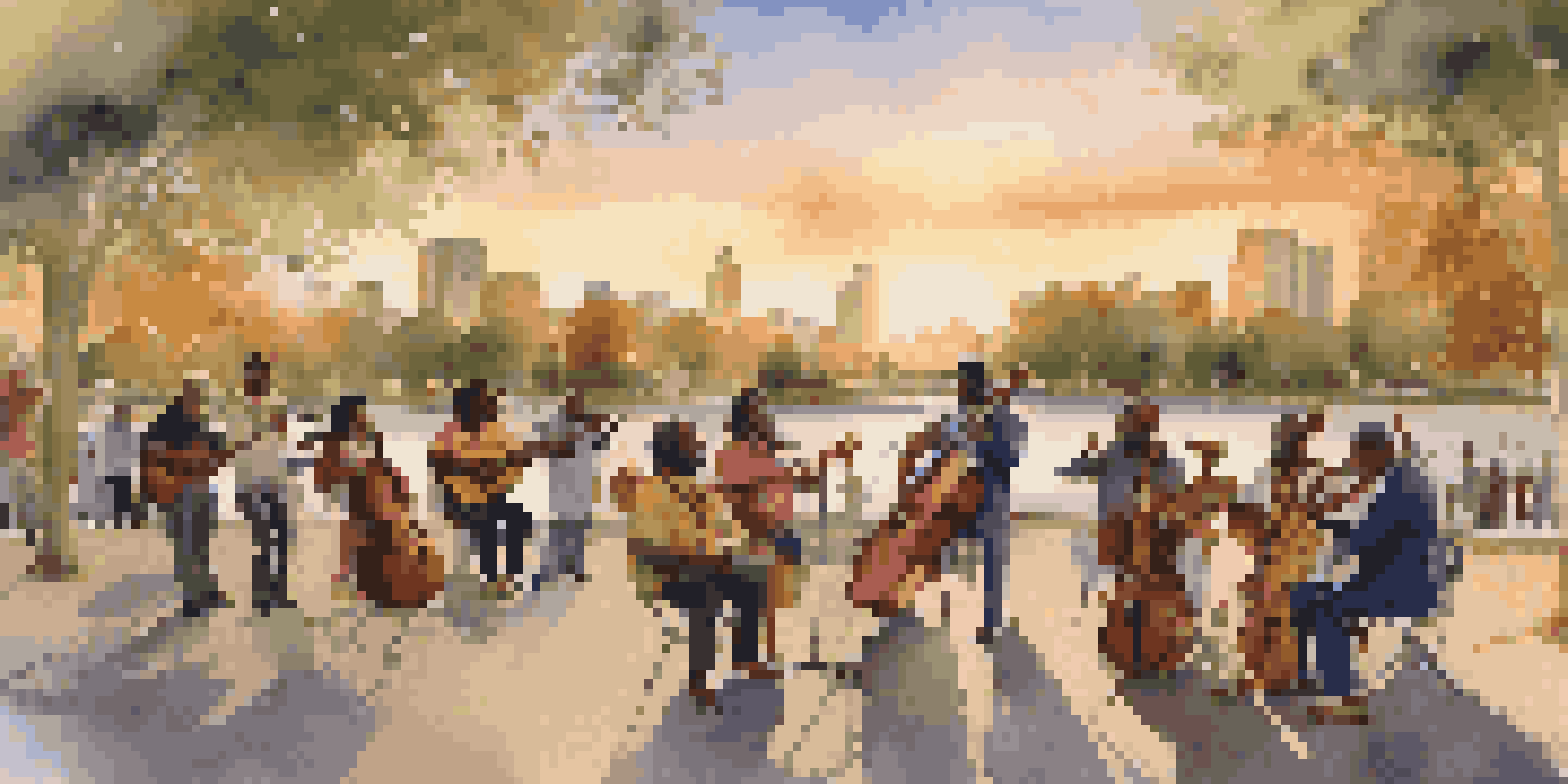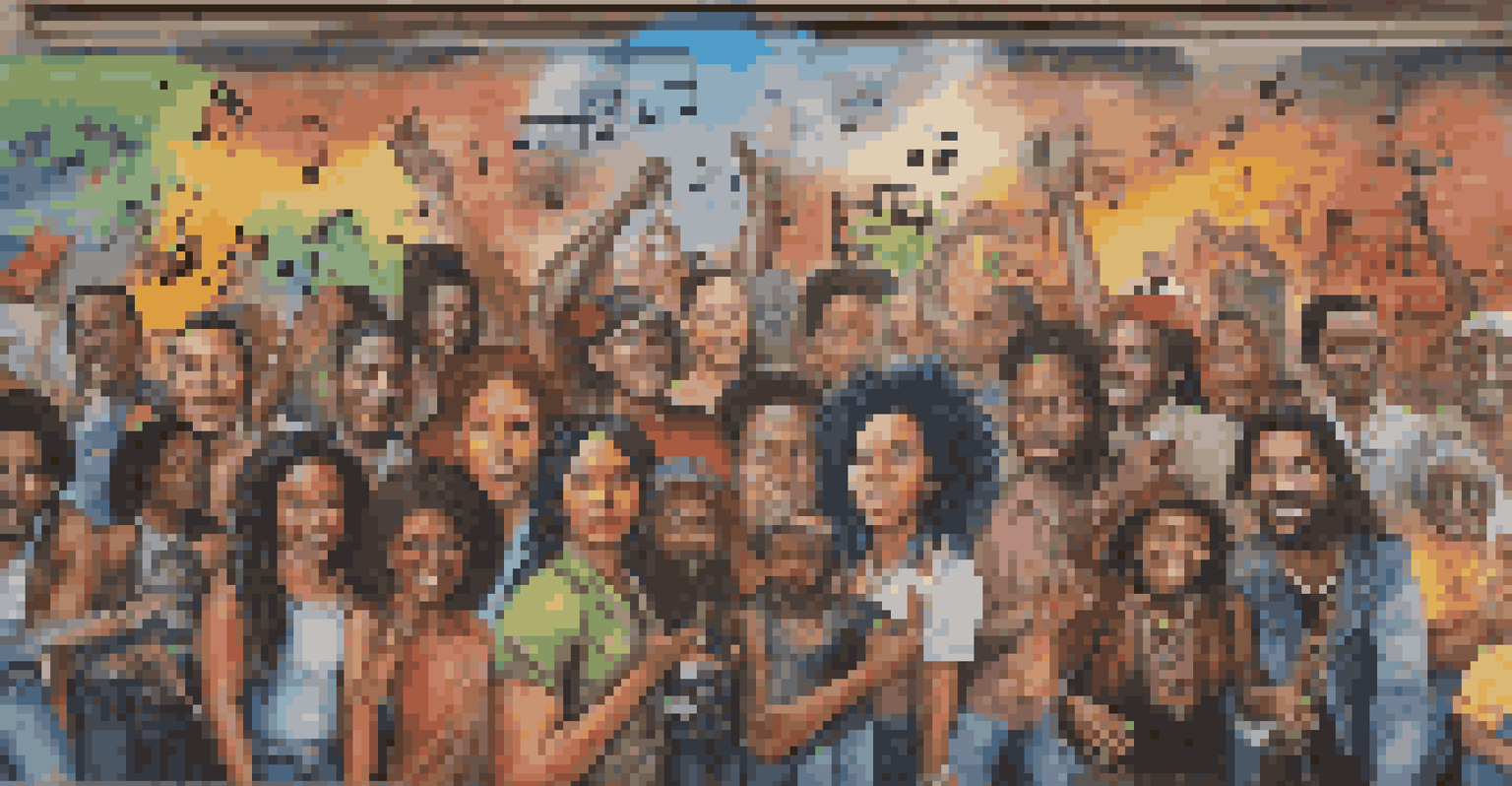Songs of the Struggle: Music in the Face of Adversity

The Power of Music in Times of Hardship
Music has always been a refuge during difficult times. Whether it's a soothing melody or an empowering anthem, songs have the unique ability to uplift spirits and forge connections. When faced with adversity, many turn to music for solace, finding strength in the shared experiences of artists who have faced similar challenges.
Music can change the world because it can change people.
Historical events, such as the Civil Rights Movement, showcase how music became a rallying cry for those seeking justice. Songs like 'A Change is Gonna Come' by Sam Cooke provided hope and motivation, encouraging people to keep pushing for their rights. The blending of emotion and activism in music resonates deeply, illustrating how art can inspire action.
Moreover, music can serve as a form of protest, giving voice to the voiceless. Through lyrics, artists express the struggles of their communities, shining a spotlight on social issues. This connection between music and social change emphasizes the role of songs as a tool for empowerment in the face of adversity.
Personal Stories: Music as a Healing Tool
Many individuals have personal stories about how music has helped them navigate tough times. For instance, someone dealing with loss might find comfort in listening to a ballad that reflects their pain. In these moments, music becomes more than just sound; it transforms into a source of healing and understanding.

Additionally, the act of creating music can be therapeutic. Songwriters often channel their emotions into lyrics, allowing them to process their feelings. This creative outlet not only helps the artist cope but can also resonate with listeners who may feel the same way, creating a shared sense of experience.
Music as a Source of Healing
During tough times, music can provide comfort and understanding, transforming individual pain into a shared experience of healing.
These personal connections to music illustrate its universal appeal. Regardless of age, background, or circumstances, people find solace in songs that articulate their struggles. This shared experience fosters a sense of community, reminding us that we are not alone in our battles.
Cultural Impact: Music Across Different Societies
Throughout history, different cultures have utilized music as a means of expressing adversity. From African tribal chants that tell stories of resilience to protest songs in Latin America, music serves as a powerful medium for cultural expression. These songs often reflect the values and struggles of the communities from which they originate.
Where words fail, music speaks.
For instance, consider the impact of reggae music in Jamaica during political turmoil. Artists like Bob Marley used their platforms to comment on social and economic issues, uniting people through their messages. This cultural significance highlights how music can transcend borders, resonating with audiences around the world.
Moreover, global movements, such as the anti-apartheid struggle in South Africa, utilized music to rally support and promote change. Songs became a powerful tool for unity, reminding individuals of their shared goal and the strength they possess when standing together against oppression.
Iconic Songs of the Struggle: A Closer Look
Certain songs have become synonymous with the struggle against adversity, earning their place in history. 'We Shall Overcome' is a prime example, emerging as an anthem for the Civil Rights Movement. Its powerful message of hope and perseverance continues to inspire generations.
Another iconic song, 'Fight the Power' by Public Enemy, encapsulates the fight against systemic racism and inequality. Its raw energy and powerful lyrics motivate listeners to confront injustice head-on. These songs not only reflect the times in which they were created but also serve as timeless reminders of the ongoing fight for equality.
Cultural Impact of Music in Activism
Music has historically played a crucial role in social movements, uniting communities and amplifying messages of resilience and justice.
Additionally, 'Alright' by Kendrick Lamar has become a modern anthem, resonating with the Black Lives Matter movement. The song's message of resilience in the face of adversity speaks volumes, reminding listeners that despite challenges, there is always hope for a better future.
The Role of Music in Mental Health Awareness
In recent years, the connection between music and mental health has gained recognition. Many studies suggest that listening to music can have therapeutic effects, alleviating symptoms of anxiety and depression. This understanding underscores the importance of music as a coping mechanism during challenging times.
Artists like Taylor Swift and Logic have openly discussed their struggles with mental health, using their platforms to raise awareness. By sharing their experiences, they encourage others to seek help and find solace in music. This dialogue creates a supportive environment where individuals feel empowered to address their mental health challenges.
Moreover, music therapy has emerged as a valuable treatment option for many. By engaging with music, individuals can explore their emotions in a safe space, fostering healing and self-expression. This innovative approach highlights the transformative power of music in improving mental well-being.
The Digital Age: Music in Modern Activism
The rise of social media has transformed how music is used in activism today. Artists can share their messages instantly with a global audience, amplifying the impact of their work. Platforms like Instagram and TikTok have become vital tools for promoting songs that address social issues and inspire change.
For example, the viral success of songs like 'This Is America' by Childish Gambino illustrates how music engages with contemporary issues. The song's powerful visuals and commentary on gun violence and racism sparked conversations worldwide, demonstrating music's ability to influence public discourse.
Future of Music and Resistance
Emerging artists are poised to continue the legacy of using music as a powerful tool for challenging injustice and inspiring change.
Additionally, streaming platforms allow listeners to discover songs that resonate with their experiences. This accessibility empowers individuals to connect with artists who share their struggles, fostering a sense of community and collective action in the digital landscape.
Future of Music: Continuing the Legacy of Resistance
As we look to the future, the role of music in addressing adversity will undoubtedly continue. Emerging artists are stepping into the spotlight, bringing fresh perspectives and new sounds to the conversation. They are embracing the legacy of those who came before them, using their music to challenge the status quo.
Moreover, cross-genre collaborations are becoming more common, blending different styles to create powerful anthems. This fusion of genres not only broadens the audience but also highlights the universal nature of struggle, reinforcing that adversity knows no boundaries.

Ultimately, the future of music promises to remain a vital force in the fight against injustice. By continuing to share stories of resilience and hope, artists will inspire future generations to rise up and create change through the power of song.